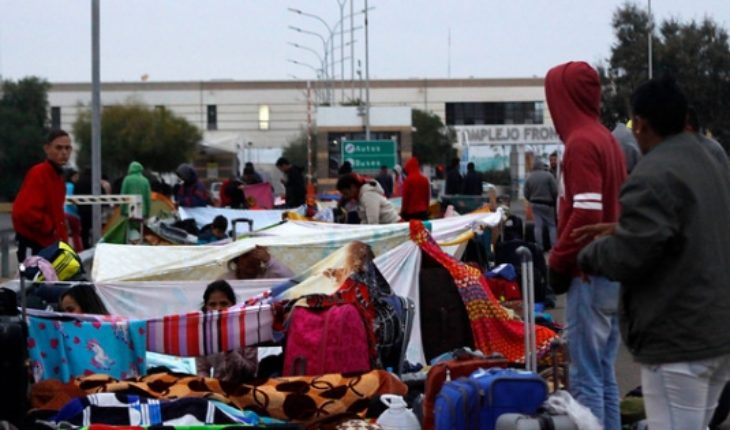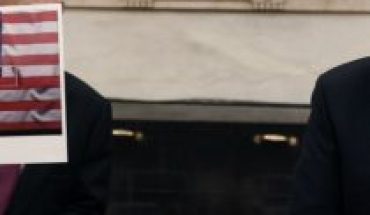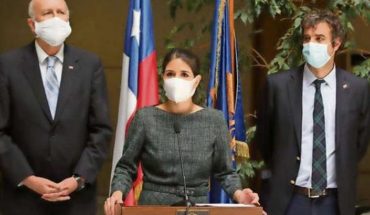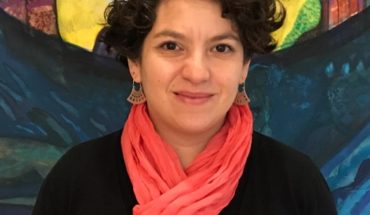The dramatic situation of Venezuelans stranded on the Chacalluta border has not only caused great concern about the humanitarian drama faced by these citizens, but also opened a tough front line between institutions such as the Jesuit Migrant Service (SJM) and the National Institute of Human Rights (INDH) with the Government.
The INDH, which during the week urged the Government to immediately allow entry to Chile, now accused the Executive of violating a “word agreement” in which it pledged to assist 63 Venezuelan migrants who were stranded at the border crossing at the Chile with Peru. The institution’s president, Consuelo Contreras, said the government “promised that people coming to Tacna would be treated special.” Consequently Venezuelan families and children took a bus towards the site, but upon arrival “the agreement was not known, leaving people on the street,” he told Radio Cooperative.
His criticism was in addition to those of the director of the SJM, José Tomás Vicuña, who recompared the attitude of the Government at this juncture with that adopted by President Sebastián Piñera last February, when he moved to Cúcuta, on the Colombian-Venezuelan border to leave humanitarian aid.
“Human rights are not until it suits me,” he told CNN Chile, adding that “when we leave infants four days at the border it means that we no longer raise awareness of the situation and that we don’t really care anymore.”
“I don’t want those who do harm to come in.”
Faced with this complicated situation, the President of the Republic, Sebastián Piñera, since the G20 Leaders Summit in Japan, defended the Government’s action in this area, noting that “we are taking special measures to better protect our borders”.
“We are advocating a cause that is just and noble: for people who enter Chile to come in telling the truth and respecting our legislation,” he added.
“We don’t want those who cause us harm to our country,” he said, in a sentence that caused controversy. In fact, former Minister Mariana Aylwin refuted it on Twitter: “President: you are misinformed. Venezuelans who are in Chacalluta do not come to cause harm, have relatives here many are professionals and start from a country destroyed by a corrupt dictatorship. It is incoherent to defend HRD in Venezuela and pass them x high in Chacalluta”.
For the communist MEP, Karol Cariola, “administrative cannot take precedence over humanitarians” and “what should not happen, and that is a conviction, that President Sebastián Piñera tends to take a position similar to that being taken by the President of the United States United States.”
Another politician who made the contradiction of the migration policy of this Government see was the Socialist senator José Miguel Insulza. According to the parliamentarian for Arica-Parinacota, with the implementation of the Democratic Visa, “Venezuelans were called in telling them that we were going to attend to them and now they are not allowed in.” He also put the spotlight on “creating chaos ourselves by inability to adapt our services in a country that has increased its number of migrants 6 or 7 times.”
“They left the Haitians on the street selling Super 8”
Another government response came from the Head of National Director of Foreign Affairs and Migration of the Ministry of the Interior, Alvaro Bellolio, who went upside against the organizations that have criticized the immigration measures.
In conversation with Radio Universe, Bellolio argued that “before the same INDH and SJM did nothing when there were Haitian citizens arriving by plane, at night, with a closed envelope, with tickets… they were left out on the streets selling Super 8 on every corner.”
Bellolio said that both organizations “encourage people to come as fake tourists or irregularly,” meaning “condemning them to be on the street and have difficulty accessing services and not being able to fully respect their social rights.”
Regarding the consular visa required by the Chilean government to the Venezuelans, the official of La Moneda noted that it was due to the detection of an “overstay” of tourism and the high percentage of visa applications.
“When they enter Chile he says they come for tourism but their real intention is another (…) continue to promote a system where people start their process in Chile by lying, we believe it is nefarious,” he said.
On the INDH’s accusations about non-compliance with the agreement involving helping 63 stranded people in Chacalluta, Bellolio argued that “taking over Peru’s Venezuelan population is complex (…) seeing the accommodation of Venezuelan migrants in other parts of the world is complex. (…) Chile cannot take care of the accommodation of all vulnerable migrants from Venezuela in the world.”
Bellolio is quoted to the Chamber
But in the midst of this controversy, Deputy DC and chair of the camera’s internal government committee, Joanna Pérez, announced that “we have quoted the National Director of Foreign Affairs and Migration, Alvaro Bellolio, to explain to us the situation that has occurred in Chacalluta Border Complex.”
“We want the Director of Aliens to give us all the background regarding this situation, how the government has acted in the face of the desire of Venezuelan migrants to enter Chile in search of a new life and the new visa requirements that will be is demanded. In addition, to discuss what has been the coordination that has been had with the IDP in this regard,” he argued.
The parliamentwas said that according to INFORMATION from the INDH, “there are about 150 Venezuelan migrants who are settled in Chacalluta and 190 at the Colchane border crossing, on the border with Bolivia, with sub-zero temperatures and high altitudes in the middle of the mountain range.”
In addition, they do not have access to drinking water, food and are staying overnight on the streets. In addition there are 400 people who are the Chilean Consulate in La Paz, Bolivia, waiting to do the paperwork to obtain the Democratic Responsibility Visa,” he said.
translated from Spanish: Scale tension for Chacalluta: Government faces humanitarian agencies over migrant situation
June 28, 2019 |





